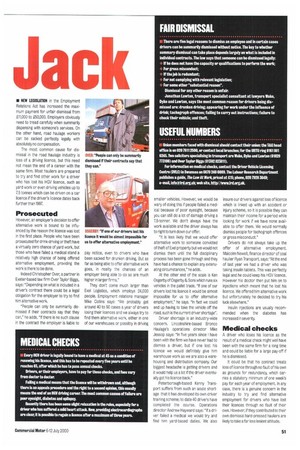Jack
Page 53

If you've noticed an error in this article please click here to report it so we can fix it.
• NEW LEGISLATION in the Employment Relations Act has increased the maximum payment for unfair dismissal from £11,000 to 250,000. Employers obviously need to tread carefully when summarily dispensing with someone's services. On the other hand, road haulage workers can be sacked perfectly legally with absolutely no compensation.
The most common cause for dismissal in the road haulage industry is loss of a driving licence, but this need not mean the end of a career with the same firm. Most hauliers are prepared to try and find other work for a driver who has lost his HGV licence, such as yard work or even driving vehicles up to 7.5 tonnes which can be driven on a car licence if the driver's licence dates back further than 1997.
Prosecuted
However, an employer's decision to offer alternative work is bound to be influenced by the reason the licence was lost in the first place. People who have been prosecuted for drink-driving or theft have a virtually zero chance of yard work, but those who have failed a medical stand a relatively high chance of being offered alternative employment, providing the work is there to be done.
Indeed Christopher Over, a partner in Exeter-based law firm Over Taylor Biggs, says: "Depending on what is included in a driver's contract there could be a legal obligation for the employer to try to find him alternative work.
"People can only be summarily dismissed if their contracts say that they can," he adds. "If there is no such clause in the contract the employer is liable to pay notice, even to drivers who have been sacked for drunken driving, But as far as being able to offer alternative work goes, in reality the chances of an employer being able to do so are much higher in larger firms."
They don't come much larger than Exel Logistics, which employs 24,000 people. Employment relations manager Mike Collins says: "We probably get around 40 to 50 cases a year of drivers losing their licences and we always try to find them alternative work, either in one of our warehouses or possibly in driving
smaller vehicles. However, we would be wary of doing this if people failed a medical because of poor eyesight, because you can still do a lot of damage driving a 7.5-tonner. We don't always have the work available and the driver always has to right to turn down our offer.
"It is less likely that we would offer alternative work to someone convicted of theft of Exel property but we would not dismiss them until the full disciplinary process has been gone through and they have had a chance to explain any extenuating circumstances," he adds.
At the other end of the scale is Ken Osgerby of Osgerby & Sons which runs six vehicles in the pallet trade. "If one of our drivers lost his licence it would be almost impossible for us to offer alternative employment," he says. "In fact we could end up having to take the vehicle off the road, such is the current driver shortage".
Driver shortage is an industry-wide concern. Lincolnshire-based Bronco Haulage's operations director Mike Jessop says: "In five years since I have been with the firm we have never had to dismiss a driver, but if one lost his licence we would definitely give him warehouse work as we are also a warehousing and distribution company. Our biggest headache is getting drivers and it would help us a lot if the driver eventually got his licence back."
Peterborough-based Kenny Transport suffers from such an acute shortage that it has developed its own driver training scheme; to date 40 drivers have completed the course, Operations director Andrew Hayward says: "If a driver failed a medical we would try and find him yard-based duties. We also insure our drivers against loss of licence which is linked up with an accident or injury scheme, so it is possible they can maintain their income for a period while looking for work if we have none available to offer them. We would normally dismiss people for tachograph offences or gross misconduct."
Drivers do not always take up the offer of alternative employment. Malcolm Newell, finance director of coal haulier Ryan Transport, says: "At the end of last year we had a driver who was taking insulin tablets. This was perfectly legal and he could keep his iiGV licence. However his doctor then put him on to injections which meant that he lost his licence. We offered him alternative work but unfortunately he decided to try his luck elsewhere."
Insulin injections are usually recommended when the diabetes has increased in severity.
Medical checks
A driver who loses his licence as the result of a medical check might well have been with the same firm for a long time and could be liable for a large pay-off if he is dismissed.
It could be that his contract treats loss of licence through no fault of his own as grounds for redundancy, which carries a statutory minimum of one week's pay for each year of employment In any case, there is a genuine concern in the industry to try and find alternative employment for drivers who have lost their licences through no fault of their own. However, if they contributed to their own dismissal hard-pressed hauliers are likely to take a far less lenient attitude.




















































































































